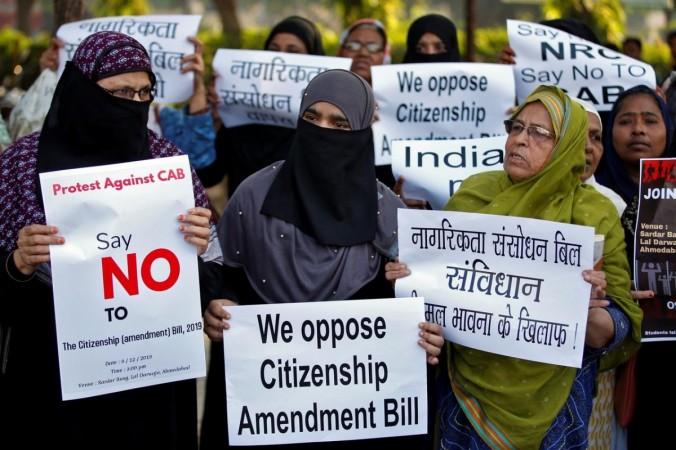The contentious Citizenship (Amendment) Bill, 2019, which was passed in Lok Sabha on Monday midnight amid fierce opposition, is set to be tabled in the Rajya Sabha on Wednesday, December 11. The bill was passed in Lok Sabha with 311 votes in support and 80 against it. The Bharatiya Janata Party seems confident of it getting clearance in the upper house as well.
While major opposition parties have described the bill as "anti-Muslim", Union Home Minister Amit Shah said that Indian Muslims have no reason to fear as it will not affect the Muslim community residing in the country. The bill had also triggered massive uproar in the Northeastern states.
Hundreds of protestors had taken to the road on Monday, to demonstrate against the controversial Bill. In Assam - one of the states that had previously opposed the bill – protestors blocked roads, burnt tyres and painted walls with slogans against the new proposal.

Student groups called for a dawn-to-dusk shutdown in four districts of the state. Shops, businesses, educational and financial institutions remained shut and public transport stayed off the roads.
In the parliament, the Treasury benches called it a historical Bill while the opposition dubbed the move as one to "kill secularism and Constitution of India" and "another attempt of partition" in the country in the name of religion and "violation of Article 14 of the Constitution".
What does the bill say?
The bill that seeks to provide Indian nationality to Hindus, Christians, Sikhs, Parsis, Jains and Buddhists fleeing persecution from Pakistan, Afghanistan and Bangladesh.
The Citizenship (Amendment) Bill seeks to amend the Citizenship Act, 1955 to make Hindu, Sikh, Buddhist, Jain, Parsi, and Christian illegal migrants from Afghanistan, Bangladesh, and Pakistan, eligible for citizenship of India.
Highlights of the Citizenship (Amendment) Bill
- Granting nationality to non-Muslim immigrants from neighbouring countries.
- The Citizenship Act, 1955, one of the requirements for citizenship was that the applicant must have resided in India in the last 12 months, as well as for 11 of the previous 14 years.
- Now the amendment relaxes the second requirement — from 11 years to six years.
- Provides that the registration of Overseas Citizen of India (OCI) cardholders may be cancelled if they violate any law.
The number game
According to reports, the BJP is confident of getting the bill passed in the Rajya Sabha with the support of 130 house members. While the current strength of the house is 240, the National Democratic Alliance (NDA) – including parties like AIADMK, Janata Dal-United and the Akali Dal – has 116 members.
Support from 14 others is expected to come from three members of the Shiv Sena, seven members of Odisha Chief Minister Naveen Patnaik's BJD, two of Andhra Pradesh Chief Minister Jagan Mohan Reddy's YSRCP and two of Chandrababu Naidu's TDP.
The Congress-led United Progressive Alliance (UPA) has 64 members and expects 46 others from the Trinamool Congress, Samajwadi Party, Telangana Rashtra Samithi (TRS) and Communist Party of India (Marxist), to oppose the bill.
Major opposition for the bill in Lok Sabha had come from Congress, Trinamool Congress, Revolutionary Socialist Party, Dravida Munnetra Kazhgam (DMK), All India Majlis-e-Ittehad-ul-Muslimeen (AIMIM), Indian Union Muslim League (IUML), AIUDF, Bahujan Samaj Party, Samajwadi Party, Aam Aadmi Party and YSR Congress Party, who had cited various articles of the Constitution.
Defending the bill
In his closing arguments in Lok Sabha, Union Home Minister Amit Shah rejected the allegations of opposition members, saying the Bill is a move to "end the atrocities against crores of migrants". "I assure that the Bill does not violate any article of the Constitution and that no citizen will be deprived of one's rights. An attempt is being made to keep the Bill in bad light," he said.
"Every citizen has been given a place in the Bill on the basis of reasonable
classification," he added. Shah said the Bill seeks to provide Indian nationality to Hindus, Christians, Sikhs, Parsis, Jains and Buddhists fleeing persecution in Pakistan, Afghanistan and Bangladesh.

The Home Minister said that the Bill has been taken after analysing the Constitutions of Pakistan, Afghanistan and Bangladesh.
Referring to the Nehru-Liaquat Ali Khan agreement signed in 1950 after the Partition of India, Shah said it was agreed to protect the rights of minorities, but only India followed it. Hindus, Christians, Sikhs, Parsis, Jains and Buddhists faced atrocities in Pakistan, Afghanistan and Bangladesh, he said.
Shah clarified that the Muslim community was not persecuted in the three Islamic countries, and the Bill specifically mentions to provide citizenship to six religious persecuted minorities.
"The people of the six minority communities who migrated to India following religious persecution in Pakistan, Bangladesh and Afghanistan will be given Indian citizenship as per this Bill. They are being given citizenship on the basis of reasonable classification. The Bill does not violate Article 14 of the Indian Constitution."

















